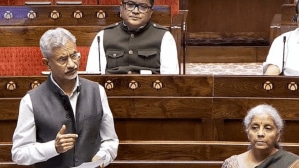Bharat Bandh: Workers across sectors protest anti-labour policies, demand job security and wage reform
At a protest site in Delhi, Satyaprakash, state secretary of AICCTU, called the moment “a do or die situation,” stressing the urgency of the strike.
 Members of various trade unions block a road during a 'Bharat Bandh' call by a forum of 10 central trade unions and their associates, in Bhubaneswar on Wednesday. (ANI Photo)
Members of various trade unions block a road during a 'Bharat Bandh' call by a forum of 10 central trade unions and their associates, in Bhubaneswar on Wednesday. (ANI Photo)Written by Sharmistha Shivhare
The nationwide strike called by central trade unions on Wednesday saw participation from across the capital, as workers from various sectors voiced deep discontent over labour reforms, contractualisation, and worsening job security. The Bharat Bandh, supported by over 10 central trade unions and farmer groups, was aimed at protesting what organisers called “anti-worker and anti-poor policies” of the central and newly elected Delhi government.
At a protest site in Delhi, Satyaprakash, state secretary of AICCTU, called the moment “a do or die situation,” stressing the urgency of the strike. Criticising the Delhi administration, he said, “Iss sarkar mei gareebi ko nahi, gareeb ko hataya jaa raha hai.”
The strike reflected unity among trade unions. Apoorva, national council member of AICCTU, noted, “Under the BJP rule, longer shifts and minimum wages is the new normal. That is why the trade union response has increased.”
Workers from the Delhi Transport Corporation (DTC), public hospitals, nursing colleges, and daily wage sectors shared stories of exploitation and insecurity. Umesh Kumar, a DTC driver, alleged that over 1,500 electric buses were brought in two years ago through private firms, displacing permanent staff. *“Nagarikta pakki hai toh naukri pakki kyu nahi?”* he asked, pointing at the long-standing issue of contractual employment in DTC.
In healthcare, nursing college workers reported being asked to pay ₹20,000 to retain jobs through contractors, with no institutional safeguards. Daily wage labourers also decried extended shifts and withheld payments. Ram Balagram, a migrant worker from Bhagalpur, said, “8-hour shifts becoming 12 hours is now normal. At least ₹2,000 from each worker’s pay is stuck with contractors.”












